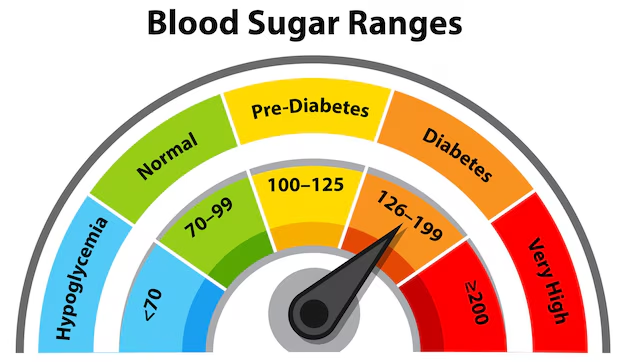Blood sugar plays a vital role in providing energy to the body, and keeping it balanced is essential for maintaining good health. In today’s fast-paced world, stress has become a constant companion, whether due to work, relationships, or daily responsibilities. While many recognize its mental toll, fewer realize how deeply stress affects physical health—especially blood sugar regulation. Understanding how stress influences blood sugar is key to maintaining both emotional and metabolic well-being.
Blood sugar, or glucose, must remain within a healthy range to support the body’s energy needs and prevent complications. Imbalances in blood sugar levels—too high or too low—can cause fatigue, irritability, and over time, lead to serious conditions like insulin resistance and type 2 diabetes. Even individuals without diabetes can experience blood sugar disruptions due to chronic stress.
This article explores the link between stress and blood sugar, examining how stress hormones affect glucose levels, the biological processes involved, and how prolonged stress can increase long-term health risks if left unmanaged.
What is Blood Sugar ?

Blood sugar, or glucose, is a simple sugar that serves as the body’s primary source of energy. It is derived from the food we eat, especially carbohydrates, and is carried through the bloodstream to cells, where it is used to produce energy. Glucose is essential for fueling the brain, muscles, and other organs, making it a critical component of overall bodily function.
The body regulates blood sugar levels within a narrow range to ensure that cells receive the energy they need without causing damage from excessively high or low glucose levels. This regulation is primarily managed by insulin, a hormone produced by the pancreas. Insulin helps cells absorb glucose from the blood and use it for energy. It also stores excess glucose in the liver and muscles for later use.
Blood Sugar Levels and Their Importance
Keeping blood sugar levels steady is very important for good health. The body works carefully to control blood sugar through a well-balanced system. When this balance is disturbed, it can cause serious health issues. Problems with blood sugar regulation can affect energy levels, mood, and overall wellness. If not managed, it may lead to conditions like diabetes or other health risks. That’s why it’s important to support the body’s natural ability to maintain healthy blood sugar levels through proper diet, exercise, and lifestyle habits every day.
Normal Blood Sugar Levels: For a healthy individual, normal blood sugar levels typically range between 70 and 100 mg/dL when fasting. After consuming a meal, blood sugar levels may rise slightly, typically reaching around 140 mg/dL, but they should return to baseline levels within two hours. This fluctuation is natural and ensures that the body has a consistent, readily available supply of energy. Maintaining stable blood sugar levels is essential for overall health, as it helps fuel bodily functions, keeps energy levels steady, and prevents spikes or crashes in blood sugar that could lead to fatigue or irritability.
Low Blood Sugar (Hypoglycemia): Low blood sugar, also known as hypoglycemia, occurs when blood sugar levels drop too low to meet the body’s energy needs. This condition can cause a range of symptoms, including dizziness, shakiness, confusion, sweating, and, in severe cases, loss of consciousness. Hypoglycemia can result from various factors such as skipping meals, exercising too intensely without proper nutrition, or taking an excessive amount of insulin in people with diabetes. Immediate treatment, such as consuming fast-acting carbohydrates like fruit juice or glucose tablets, is necessary to raise blood sugar levels and restore normal function.
High Blood Sugar (Hyperglycemia): When blood sugar levels remain elevated for an extended period, it leads to a condition known as hyperglycemia. This is often associated with uncontrolled diabetes and can result in symptoms such as increased thirst, frequent urination, fatigue, blurred vision, and headaches. Chronic hyperglycemia can be harmful and may lead to serious complications like nerve damage, kidney disease, cardiovascular issues, and vision problems. Managing high blood sugar is crucial to prevent these long-term health issues. Regular monitoring, a balanced diet, exercise, and proper medication are necessary to maintain healthy blood sugar levels and reduce the risk of complications.

The Role of Insulin: Insulin is a hormone that plays a crucial role in regulating blood sugar levels. It facilitates the uptake of glucose into cells, where it can be used immediately for energy or stored for future use. By promoting this glucose uptake, insulin ensures that the body has a steady supply of energy throughout the day. Insulin also prevents the body from breaking down fat and muscle for energy when glucose is available. However, in cases of insulin resistance—where the body’s cells become less responsive to insulin—blood sugar levels rise, leading to a condition known as type 2 diabetes. Over time, insulin resistance can impair the body’s ability to manage blood sugar effectively, making it more challenging to maintain healthy glucose levels.
The Link Between Stress and Blood Sugar
Now that we understand the importance of blood sugar regulation, it’s essential to explore the connection between stress and blood sugar levels. Stress triggers a complex physiological response in the body, impacting various systems, including metabolism.
When stressed, the body releases hormones like cortisol and adrenaline, which can cause blood sugar levels to rise. These hormones prepare the body for a “fight-or-flight” response, but chronic stress can disrupt normal blood sugar regulation, potentially leading to higher levels and affecting overall health.
How Stress Affects the Body’s Stress Response System

When you experience stress, whether it’s acute or chronic, your body activates its fight-or-flight response. This is an evolutionary mechanism that prepares you to react to perceived danger. It involves two main systems: the sympathetic nervous system (SNS) and the hypothalamic-pituitary-adrenal (HPA) axis.
Sympathetic Nervous System (SNS): The Sympathetic Nervous System (SNS) is activated during times of stress, preparing the body to respond to perceived threats. When stressed, the SNS releases catecholamines, including adrenaline and norepinephrine. These hormones trigger several physiological changes: an increased heart rate, elevated blood pressure, and enhanced alertness. Additionally, catecholamines stimulate the release of glucose from the liver into the bloodstream, providing a quick source of energy for muscles and other tissues, enabling the body to react swiftly. While this response is essential for short-term stress, chronic activation of the SNS can lead to sustained high blood sugar levels and other metabolic disturbances.
Hypothalamic-Pituitary-Adrenal (HPA) Axis: The Hypothalamic-Pituitary-Adrenal (HPA) axis plays a central role in the body’s response to stress through the release of cortisol, often known as the stress hormone. When activated, the HPA axis triggers the release of cortisol, which has several critical effects on metabolism. Cortisol promotes gluconeogenesis, the process by which the liver produces glucose from non-carbohydrate sources such as proteins and fats, ensuring the body has sufficient energy during stress. However, cortisol also reduces the effectiveness of insulin, impairing the body’s ability to use glucose efficiently. As a result, blood sugar levels can remain elevated, and insulin resistance may develop over time, contributing to metabolic dysfunction and an increased risk of conditions like type 2 diabetes.
While this stress response is helpful in acute situations (e.g., escaping danger), when stress becomes chronic, it leads to sustained high levels of glucose in the blood, which can have long-term health consequences.
How Stress Elevates Blood Sugar
Stress triggers the release of several hormones that influence blood sugar regulation. These hormones work together to increase the availability of glucose for immediate energy. However, when stress is prolonged, it can lead to persistently high blood sugar levels. Here’s how:
Cortisol and Glucose Production: When the body is under stress, it releases a hormone called cortisol. One of cortisol’s main roles is to signal the liver to make and release more glucose. This process is known as gluconeogenesis and is meant to give the body extra energy to face the stressful situation. However, if stress continues over a long period, cortisol keeps telling the liver to produce glucose even when the body doesn’t need it. This leads to too much glucose in the blood, which can become a serious health concern over time.
Reduced Insulin Sensitivity: Long-term stress and constant high levels of cortisol can cause the body’s cells to become less sensitive to insulin. This condition is called insulin resistance. When cells do not respond well to insulin, glucose can’t enter them as easily, so it stays in the bloodstream, raising blood sugar levels. The pancreas tries to fix this by producing more insulin. But if this continues for too long, the pancreas can become overworked and struggle to keep up, leading to consistently high blood sugar levels and increasing the risk of diabetes.
Elevated Catecholamines: Stress not only increases cortisol but also boosts the levels of other stress hormones like adrenaline and norepinephrine, known as catecholamines. These hormones help the body react quickly to danger by stimulating the liver to release more glucose and slowing down insulin release. This ensures that the body has fast access to energy. However, when these hormones remain high due to chronic stress, they also contribute to raised blood sugar levels, putting further strain on the body’s ability to manage glucose properly.
The Impact of Chronic Stress on Blood Sugar
The effects of chronic stress on blood sugar regulation can be particularly concerning for individuals at risk for or living with diabetes. When the body is continuously exposed to elevated cortisol levels and other stress hormones, it becomes more difficult to maintain stable blood sugar levels.
Increased Risk of Insulin Resistance and Type 2 Diabetes: Chronic stress can lead to prolonged elevations in blood sugar levels, which, over time, can reduce the effectiveness of insulin. This reduced insulin sensitivity, known as insulin resistance, is a major risk factor for the development of type 2 diabetes. As stress hormones like cortisol keep blood sugar levels high, the body’s cells become less responsive to insulin, preventing glucose from being absorbed efficiently. If left unchecked, insulin resistance can worsen, potentially requiring medical intervention, such as medications or insulin therapy, to manage blood sugar levels and prevent further complications.
Obesity and Poor Lifestyle Choices: Chronic stress often leads to unhealthy behaviors that contribute to blood sugar imbalances. People under ongoing stress may turn to emotional eating, consuming comfort foods that are high in sugar, fat, and refined carbohydrates. This not only spikes blood sugar levels but also contributes to weight gain. Additionally, stress can negatively affect sleep patterns and lead to insufficient rest, which is critical for maintaining healthy blood sugar levels. A lack of proper sleep, combined with a sedentary lifestyle, both of which are commonly associated with stress, can further exacerbate insulin resistance and increase the risk of obesity, creating a vicious cycle of poor metabolic health.

Increased Inflammation: Chronic stress is also closely linked to increased inflammation within the body, a factor that can significantly impair insulin sensitivity. Elevated levels of cortisol and other stress hormones promote the production of pro-inflammatory cytokines, which contribute to systemic inflammation. This inflammation interferes with insulin’s ability to function properly, making it harder for cells to absorb glucose. Over time, this heightened inflammation can accelerate the development of insulin resistance, contributing to the onset of diabetes, metabolic disorders, and other related health issues, further complicating blood sugar regulation.
Managing Stress to Control Blood Sugar
Given the significant effects of stress on blood sugar regulation, it’s important to adopt strategies for managing stress to protect your health. Effective stress management not only helps with emotional well-being but can also improve blood sugar control and reduce the risk of developing diabetes.

Mindfulness and Relaxation: Mindfulness practices, such as meditation, deep breathing exercises, and yoga, are powerful tools for managing stress and supporting overall health. These techniques activate the parasympathetic nervous system, which helps counterbalance the stress response by lowering cortisol levels. Reducing cortisol through relaxation practices can promote relaxation, decrease inflammation, and help stabilize blood sugar levels. By engaging in mindfulness regularly, you not only manage stress more effectively but also improve your body’s ability to regulate glucose and support overall well-being.
Physical Activity: Exercise is one of the most effective ways to alleviate stress and improve blood sugar control. Physical activity has numerous benefits, including reducing cortisol levels, enhancing insulin sensitivity, and supporting overall metabolic health. Regular exercise, whether it’s aerobic, strength training, or even activities like walking, promotes efficient glucose uptake by cells and helps maintain stable blood sugar levels. Additionally, exercise boosts mood and reduces stress hormones, creating a positive feedback loop that benefits both physical and mental health. Incorporating consistent physical activity into your routine can help reduce the long-term effects of stress on blood sugar regulation.
Healthy Eating: A balanced diet is essential for stabilizing blood sugar levels, especially when managing the effects of stress. Focusing on whole foods that are rich in fiber, lean proteins, and healthy fats helps maintain steady blood sugar levels throughout the day. These foods slow the absorption of glucose, preventing the spikes in blood sugar that often occur in response to stress. Reducing the intake of processed sugars, refined carbohydrates, and high-calorie comfort foods can also prevent stress-induced blood sugar fluctuations. A nutrient-dense, well-rounded diet not only supports energy levels but also helps manage stress and promote better metabolic function.
Social Support: Having a strong support system is essential for managing stress effectively. Connecting with friends, family, or mental health professionals can provide emotional relief and practical strategies for coping with stress. Social support helps reduce the impact of stress on the body by offering a sense of security, understanding, and shared experiences. Talking through challenges with others can alleviate mental burdens and promote healthier coping mechanisms. Strong social connections also encourage more positive behaviors, such as engaging in physical activity and maintaining a balanced diet, which contribute to better blood sugar regulation and overall health.
Conclusion
Stress has a profound impact on blood sugar regulation, influencing both short-term and long-term health. The body’s stress response, while adaptive in the short term, can contribute to elevated blood sugar levels and insulin resistance when stress is chronic. This makes stress management essential not only for mental well-being but also for maintaining healthy blood sugar levels and preventing the onset of diabetes.
By understanding the link between stress and blood sugar, individuals can take steps to manage stress effectively and protect their health. Adopting stress-reducing techniques like mindfulness, exercise, and healthy eating can improve blood sugar regulation and reduce the risk of developing serious metabolic conditions like type 2 diabetes.
FAQs
- How does stress raise blood sugar levels ?
Stress triggers the release of hormones like cortisol and adrenaline, which increase glucose production in the liver and reduce insulin sensitivity, causing blood sugar to rise. - Can stress cause diabetes ?
Chronic stress can contribute to insulin resistance, a key factor in the development of type 2 diabetes, especially when combined with poor lifestyle choices. - How can I manage stress to control my blood sugar ?
Practices like mindfulness, regular exercise, a balanced diet, and strong social support can help manage stress and maintain healthy blood sugar levels. - Is stress the only factor that affects blood sugar ?
No, other factors like diet, physical activity, sleep, and genetics also play a significant role in regulating blood sugar levels. - Can stress cause low blood sugar ?
While stress typically raises blood sugar, in certain situations (like skipping meals or overexertion), stress can contribute to low blood sugar in vulnerable individuals.



